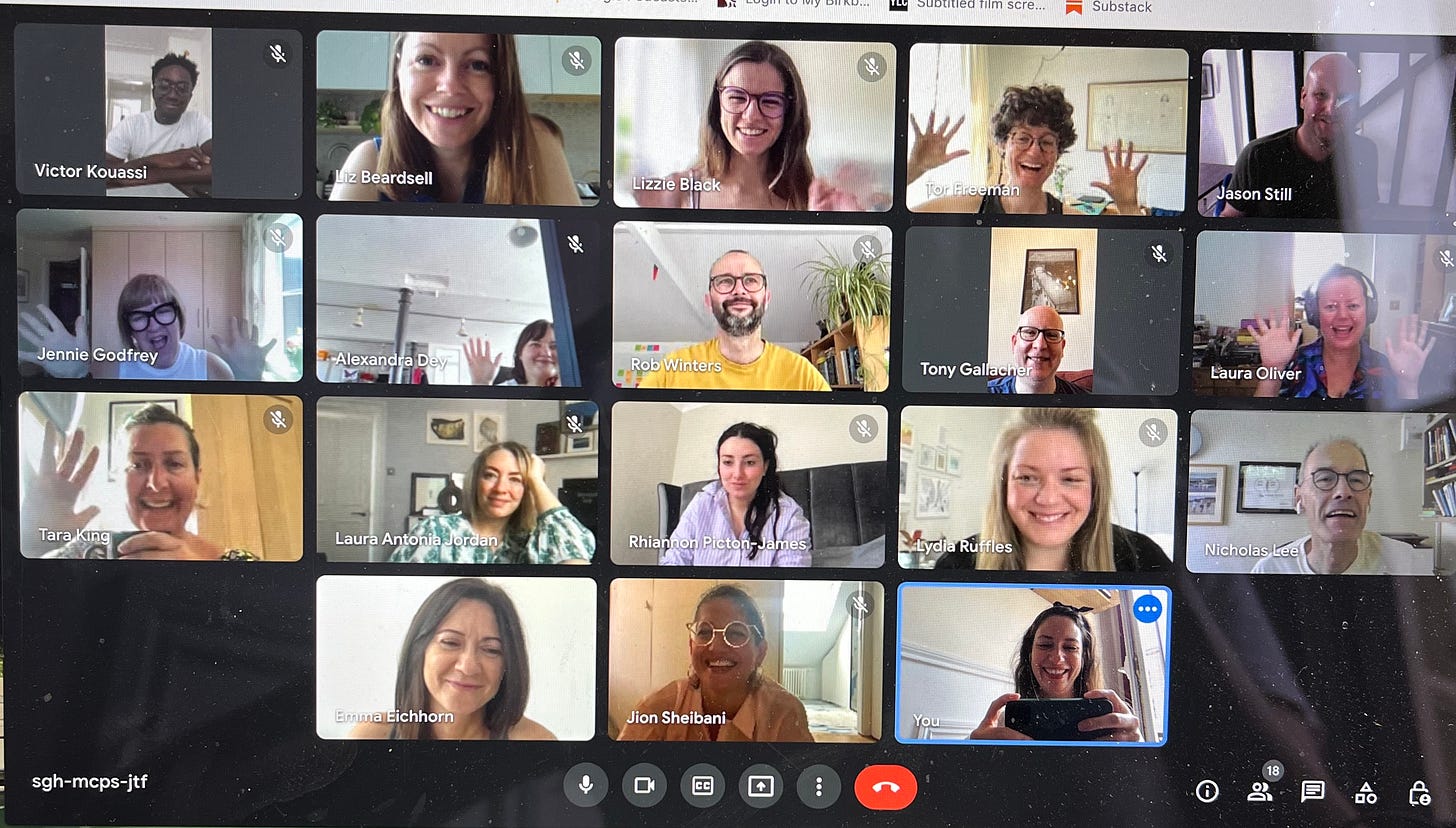Two things journalism taught me about good writing
One to cheer us all up and another on structure. Plus, the Creative Club returns on Sunday.
Paid subscribers can listen to an audio version of this newsletter here (or in your podcast app).
It occurred to me this week that when I talk about my writing, I rarely talk about my job. That’s quite odd, since I’m a journalist, and journalism is where I’ve done the vast majority of my writing as an adult (unless you count Whatsapp).
It’s also, relatedly, where my work has shown the most improvement, and certainly where I feel the most confident. Sometimes I disregard the things I’m competent at; they seem a lot less interesting than the things I’m bad at.
So today I thought I’d share a couple of things that I learnt about writing through being a journalist. Here’s the most game-changing one, in a nutshell:
You can be bitterly disappointed in your own writing for a surprisingly long time at the beginning, and still get there in the end.
Eight or nine years ago – I was around 30, maybe a bit older – I went out for dinner with my good friend Tor Freeman, a very talented illustrator and artist. Tor was a few years ahead of me in her career and already doing brilliantly in the world of children’s books (you can find some of her books here and should certainly buy them for a child you love, because they’re hilarious and delightful).
We were at Brasserie Zedel in London, which I love because it looks very grand, but it’s not expensive. This was important because I was in a continual state of anxiety about money and work. That situation has recurred throughout my journalism career and still does, to be honest, but on this evening I was in deep despair. It’s one of the few times that I remember actually wondering whether I should give up and try a different career.
From the outside, it probably looked like things were going well. I had managed to get a (freelance) foot in the door at The Cut, New York magazine’s fashion spin-off, and I was reporting about British fashion and art. At some point this had led to commissions for other American publications including The New York Times. But those American bits were not paying much at all, and I was spending most of my time padding it out with soul-destroying copywriting work. One memorable highlight was writing an advertorial (an advert dressed up to look like an article) about Domestos toilet cleaner. I don’t remember the headline… maybe something like ‘Five Top Tips For a Super-Clean Bowl’. I did not feel great about myself.
I’d taken a weird route to journalism (for a few years I was mostly writing digital content for Channel 4 shows like Big Brother – I wrote about that experience for Vogue last week, if you’re interested). I didn’t have a lot of contacts at the time within the British press – in fact even though I’d been working for several years, nobody knew who I was. I’d had one very dispiriting experience where I’d managed to successfully pitch something to The Guardian, completely psyched myself out about it, therefore not done a good job, and fallen into a spiral of self-loathing.
As a side note: I often think journalism is the best job in the world (tons of variety; incredible access to interesting people and events; clever and funny colleagues, and world-class gossip), but it’s also brutal. When you’re doing something creative – and I do think there’s a creative aspect to it – it’s hard to take blunt criticism; unfortunately, that’s what a journalist’s job involves, day after day after day. It’s writing, then receiving urgent, often tactless feedback, and sometimes rewriting, and trying to grow a thicker skin as quickly as you can, to make the whole thing less nightmarish.
But more importantly, at the time, I didn’t think my work was good. In fact sometimes, I knew for certain that it wasn’t. I could see that an article wasn’t working, that it didn’t read as well as the writers I admired, but I couldn’t fix the problems. Writing some articles felt like being trapped in The Crystal Maze, trying to work out a combination code in the Aztec Zone while standing on a thin beam over a murky pool, while a timer ticked down and my editors stood outside shouting at me in impatient disgust.
I’d been writing professionally for six or seven years, and it was still alarmingly dispiriting work, an alarming proportion of the time.
The thought that professional writing might not be for me was terrifying, since it was the only thing I’d ever imagined I would do. But Tor was very calming. She said it takes longer than you think; she said she’d felt that way before things had clicked for her creatively. After that meal, she sent me a link to a video of the legendary radio host and producer Ira Glass being interviewed, and you’ve probably already seen this, but if you haven’t – here it is.
My favourite bit is when he says ‘I took longer to figure out how to do this than anybody I’ve ever met.’ Then he plays a clip of a radio report he made eight years into his career, holding his hands up in exasperation as he listens to his younger self tortuously reporting a food production issue in Mexico. ‘[When I recorded this] I’m not a beginner, I’m deep deep into it,’ he says. ‘I guess I’m saying – it takes a while, it’s going to take you a while, it’s normal to take a while, and you have to fight your way through that.’
That video and the conversation with dear Tor – they cheered me up so profoundly. I kept going, and I got there eventually. My work now isn’t flawless, but at least it’s caught up with my taste; at least I no longer disappoint myself when I do my job. I think it’s really useful to remind ourselves that quality and skill take a very long time.
That’s sort of a morale story, so here’s a quick practical thing that also changed my journalism career.
When you’re writing a big feature, often you have to interview multiple people, and then try to weave together their perspectives on a topic, probably along with statistics and background information, into a narrative. It needs to feel like you’re telling the reader a story, and that takes craft; this is why I say it’s creative.
What that means is that you start out with a huge amount of stuff: sometimes looooong transcripts of interviews, endless links to news stories you’ve come across that contain useful info, perhaps a book that you’re consulting, and so on. And you have to absorb all of that and produce something much, much shorter, which hangs together and feels focused.
Most importantly – and I think this is true of all writing – the reader needs to feel that the writer is fully in control of the situation. You don’t ever want to read something and feel that the writer didn’t really know where they were going with it.
For years, I used to dump all of that stuff, barely edited, into one big Word document – and then try to whittle it all down and rearrange it until it became a feature. That was painful, and it was the wrong approach.
Now I keep everything in separate documents, open in different tabs, and I start with a blank page. If I don’t know where to start, I ask myself how I would quickly summarise the story to a friend, if they asked me, ‘What are you working on at the moment?’ What’s the juiciest bit? What’s the most surprising or funny bit? What’s the example that will make my friend understand immediately why it’s an interesting story? That’s where to start writing an article.
It took me a long time to understand that my instinct to communicate with friends and acquaintances – because I am a Chatty Cathy – should be guiding how I communicate in my work too.
Before I go, I want to say a huge thank you to the brilliant group who joined the In Writing Creative Hour on Sunday. I absolutely loved it.
On Sunday morning I’ll be sending out a Creative Club writing prompt to paid subscribers. I look forward to the work you always share in the comments, and the brilliant conversations that unfold there.
Until then, good luck with your writing!






I loved reading this, thank you for your honesty! It’s actually very comforting to know that other, way more experienced writers also feel like this. I’m only just under a year into my writing career and every single time I submit anything, I descend into a pit of self-loathing and convince myself that’s the last paid work I’ll ever get, expecting any second to get an email saying “this isn’t up to standard....” Sometimes I’m paralysed by the negative thinking and seem to write random sentences which don’t relate to each other at all but somehow add up to the required word count. So thank you - I’m going to come back and read this again very soon!
I've discovered even the most famous and talented authors are never satisfied with their published works. All writers see their words out there and feel a deep desire to rewrite it, knowing they could do a better job now. And that may be true. I think when it comes to writing, we have to teach ourselves to allow a stopping point for our writing and revising. Otherwise, nothing will get published. Or live with constant feelings of inadequacy from reading our words that have been released into the world.
Leo Tolstoy is the perfect example. He rewrote the entire novel "War and Peace" seven times over the years. He was a hardcore perfectionist.
As for other authors, it isn't unusual for many to be compelled to rewrite their earlier work before allowing publishers to release it again. Both Stephen King and Dean Koontz have done this as well as many other authors.
With all that said, I'm incredibly guilty of being hard on my own writing. I don't think I'll ever develop that inflated author's ego, even if I were to become crazy famous. I tend to hold myself to my standards and not others.
Obviously you already know about all the above. Better than I do, without a doubt.
I truly appreciated this part:
"It took me a long time to understand that my instinct to communicate with friends and acquaintances – because I am a Chatty Cathy – should be guiding how I communicate in my work too."
Never thought about things that way. But makes total sense. Thank you for this article. It is a relief for a writer such as yourself to share your inner struggles and how they impacted you. And how you evolved to not let it hold you back as much anymore.